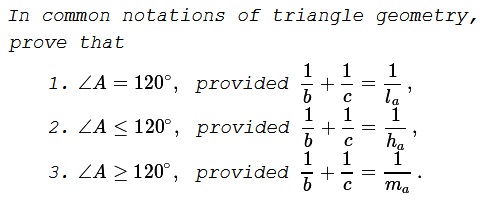From Angle Bisector to 120 degrees Angle
Problem

Solution
First off, $\displaystyle S=\frac{1}{2}bc\sin\alpha.\,$ On the other hand, $\displaystyle S=\frac{1}{2}\left(b\cdot l_a\sin\frac{\alpha}{2}+c\cdot l_a\sin\frac{\alpha}{2}\right).\,$ It follows that
$\displaystyle\frac{1}{b}+\frac{1}{c}=\frac{\sin\alpha}{\displaystyle l_a\sin\frac{\alpha}{2}}=\frac{\displaystyle 2\cos\frac{\alpha}{2}}{l_a}.$
Hence, to have $\displaystyle\frac{1}{b}+\frac{1}{c}=\frac{1}{l_a},$ we need $\displaystyle\cos\frac{\alpha}{2}=\frac{1}{2},\,$ i.e. $\displaystyle\frac{\alpha}{2}=60^{\circ}\,$ and $\alpha=120^{\circ}.$
The two other conditions, are somewhat of a red herring, though they do make an elegant problem. In any triangle, $h_a\le l_a\le m_a.\,$ For the second condition, we has, as above, $\displaystyle\cos\frac{\alpha}{2}=\frac{1}{2}\cdot\frac{l_a}{h_a}\ge\frac{1}{2},\,$ making $\alpha\le 120^{\circ}.\;$ Clearly, the less stringent requirement $\displaystyle\frac{1}{b}+\frac{1}{c}\ge\frac{1}{l_a}\,$ would lead to the same conclusion.
The third condition is treated similarly: suffice it to request $\displaystyle\frac{1}{b}+\frac{1}{c}\le\frac{1}{l_a}\,$ to derive $\alpha \ge 120^{\circ}.\;$ The problem would of course loose in elegance.
Acknowledgment
This is a problem from V. V. Prasolov's Problems in Planimetry v. II, 1986 (in Russian).
What Is Red Herring
- On the Difference of Areas
- Area of the Union of Two Squares
- Circle through the Incenter
- Circle through the Incenter And Antiparallels
- Circle through the Circumcenter
- Inequality with Logarithms
- Breaking Chocolate Bars
- Circles through the Orthocenter
- 100 Grasshoppers on a Triangular Board
- Simultaneous Diameters in Concurrent Circles
- An Inequality from the 2015 Romanian TST
- Schur's Inequality
- Further Properties of Peculiar Circles
- Inequality with Csc And Sin
- Area Inequality in Trapezoid
- Triangles on HO
- From Angle Bisector to 120 degrees Angle
- A Case of Divergence
- An Inequality for the Cevians through Spieker Point via Brocard Angle
- An Inequality In Triangle and Without
- Problem 3 from the EGMO2017
- Mickey Might Be a Red Herring in the Mickey Mouse Theorem
- A Cyclic Inequality from the 6th IMO, 1964
- Three Complex Numbers Satisfy Fermat's Identity For Prime Powers
- Probability of Random Lines Crossing
- Planting Trees in a Row
- Two Colors - Three Points
|Contact| |Front page| |Contents| |Geometry|
Copyright © 1996-2018 Alexander Bogomolny73729183
